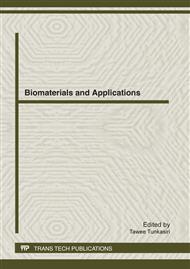p.563
p.567
p.571
p.575
p.579
p.583
p.587
p.591
p.595
The Efficiency Development of Ammonia-Odor Sensor Based on PSE-Polymer/SWNT Nanocomposite
Abstract:
In this work, we have investigated and optimized the fabrication process of ammonia sensor based on poly (styrene-co-maleic acid) partial isobutyl/methyl mixed ester/single-wall carbon nanotubes (PSE/SWNT) nanocomposite leading to the standardized and highly efficiency of device. The proper ratio of sensing material loading was achieved by varying the SWNT concentration to reach to the best sensing properties. PSE/SWNT sensors were fabricated by spin-coating technique on the interdigitated gold electrodes by controlling the reference resistance in range of 1-10 kΩ. Two groups of the fabricated sensors (carboxylic functionalized SWNT (SWNT-COOH) and hydroxyl functionalized SWNT (SWNT-OH)) with five different percent loadings were tested with various concentrations of ammonia volatile. Electrical resistances of these sensors were measured and modeled on the percolation theory approach, in order to explain and determine the appropriate composition from their mechanisms.
Info:
Periodical:
Pages:
579-582
DOI:
Citation:
Online since:
April 2012
Price:
Сopyright:
© 2012 Trans Tech Publications Ltd. All Rights Reserved
Share:
Citation:


